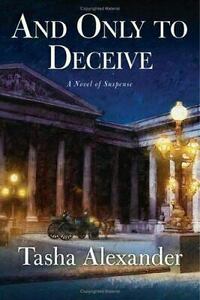You need to sign in or sign up before continuing.
Take a photo of a barcode or cover
A really entertaining read. I especially appreciated that the heroine behaved and thought in ways appropriate to her era.
The main character had an irritating habit of obviously misreading the motives and feelings of her fellow characters - a heavy handed (unsubtle) portrayal by the author. The plot not difficult to follow, and soon unraveled, before the denouement. Sometimes amusing, and I've no real complaints about the ending.
Loved it - I thought it was a great first, even though Lady Emily went a *tad* over board with her obsessive love post mortem. The author includes some sections at the back about what was historically accurate in the story and what was authorial license as well as some notes on story inspiration and location information. All of it was particularly welcomed by this novice of all things historical. I'm looking forward to the rest of the books in the series.
Full review: http://jenn.booklikes.com/post/979727/onlytodeceive
Full review: http://jenn.booklikes.com/post/979727/onlytodeceive
A nice book, in the same style as Stealing Athena in the ambiance of Victorian period.
I can't help thinking this would have been a much better book had it not been written in the first person. The heroine seems oddly distant and cold, even at her most emotional, despite our being inside her head. Perhaps she would have felt warmer if we'd seen her more from the outside and been able to project our own warmth onto her.
An enjoyable series-quality mystery, about a Victoria-era feminist-ish widow with lots and lots of money. (Sometimes it would be nice to find a less well-funded amateur sleuth.)
Her mother the shrew is too shrewish, but otherwise it's a nice light read, reminiscent of CS Harris.
Her mother the shrew is too shrewish, but otherwise it's a nice light read, reminiscent of CS Harris.
J'ai un attrait incompréhensible pour les séries policières historiques écrites par des Américaines. Ce n'est pas pour leur originalité, car elles suivent toujours le même schéma. L'histoire se déroule généralement à l'époque victorienne (ou bien durant la Régence, ça dépend des auteurs). Notre héroïne, mariée jeune et veuve à peine plus âgée, est toujours charmante et très à l'étroit dans son rôle de femme de la bonne société, à une époque patriarcale et bien pensante. Elle se révélera plus ou moins idiote ou moralisatrice suivant les séries. Fin du prologue. Au premier chapitre, apparaît le mystérieux (et bel) homologue. Est-il un ennemi? un allié? Boum! Meurtre. Après avoir résolu ce mystère, ils voguent vers de nouvelles aventures, de plus en plus décevantes à partir du tome trois. À un moment, ils se marient. Voilà.
"And Only to Deceive" a l'originalité de ne pas traiter d'un meurtre, mais d'un vol organisé d'antiquités grecques . C'est assez bien écrit et dans l'ensemble, plutôt respectueux du contexte historique. L'intrigue est bien menée, pas vraiment fascinante, mais agréable. La héroïne, quoique stéréotypée, est pleine de promesses (sa relation avec sa mère est très drôle) si on lui pardonne une extrême naïveté bien cul-cul. Personnellement, je trouve que l'amour ambigu qu'elle porte à son défunt mari est une jolie touche (mais sans surprise, très gnan-gnan). Par contre, je comprend mal qu'elle en vienne à le suspecter, alors même qu'elle possède son journal intime. Mais bon, il faut bien étoffer l'intrigue, qui s'amenuise avec le temps.
Alors, pourquoi je lis ces livres ? Je n'ai pas vraiment d'explication. C'est un plaisir coupable j'imagine. Car ce n'est pas vraiment qu'ils soient sans intérêt. C'est juste que j'aimerais un jour pouvoir lire les aventures d'un ravissant idiot et de son intelligent et capable homologue féminin.
"And Only to Deceive" a l'originalité de ne pas traiter d'un meurtre
Alors, pourquoi je lis ces livres ? Je n'ai pas vraiment d'explication. C'est un plaisir coupable j'imagine. Car ce n'est pas vraiment qu'ils soient sans intérêt. C'est juste que j'aimerais un jour pouvoir lire les aventures d'un ravissant idiot et de son intelligent et capable homologue féminin.
I don’t know how I feel about this one.
I liked the characters, Emily, Colin, Margaret, Cecile, but i thought the plot meandered a little and the mystery wasn’t as gripping as it could be. It felt sort of all over the place and it was hard to keep track. I’ve borrowed the next one in the hopes it’s a bit more interesting.
The narration is a lot of telltelltell and I felt at some points I was being lectured, which I do not like in my fiction.
3? 2.5?
I liked the characters, Emily, Colin, Margaret, Cecile, but i thought the plot meandered a little and the mystery wasn’t as gripping as it could be. It felt sort of all over the place and it was hard to keep track. I’ve borrowed the next one in the hopes it’s a bit more interesting.
The narration is a lot of telltelltell and I felt at some points I was being lectured, which I do not like in my fiction.
3? 2.5?
This is a difficult one. There are lots of things I liked about the book - its late Victorian setting, the heroine's awful mother stealing every scene she's in, the involvement of The Iliad (in all its English translations, and the ancient Greek too), a good sense of period detail and a really intriguing backstory. The way that the late Lord Ashton's diaries reveal a more complex character than his public image showed is ingenious and moving.
It's just that you know you're in trouble with a book when the most interesting character in it died 18 months before the start. Lady Ashton's dead husband - his motivations, his private reminiscences, his wide-ranging interests - is more fleshed out than the heroine herself or any of her friends and acquaintances. Lady Ashton herself is given such a pedestrian voice - the whole book is in the first person, and she seems to speak & think in complete paragraphs, with a stilted vocabulary - that the force of her passion (she discovers the joy of Ancient Greek art and literature) is undermined by the delivery. The plot is a little slow, and apart from flashes of humour from the villain, there is no real characterisation. A real pity, because the concept was a good one.
I think I'll read the sequel, though, to see if the style matures.
It's just that you know you're in trouble with a book when the most interesting character in it died 18 months before the start. Lady Ashton's dead husband - his motivations, his private reminiscences, his wide-ranging interests - is more fleshed out than the heroine herself or any of her friends and acquaintances. Lady Ashton herself is given such a pedestrian voice - the whole book is in the first person, and she seems to speak & think in complete paragraphs, with a stilted vocabulary - that the force of her passion (she discovers the joy of Ancient Greek art and literature) is undermined by the delivery. The plot is a little slow, and apart from flashes of humour from the villain, there is no real characterisation. A real pity, because the concept was a good one.
I think I'll read the sequel, though, to see if the style matures.
A well-done suspense novel that captures the Victorian era without getting bogged down in Victorian prose. Very enjoyable.





